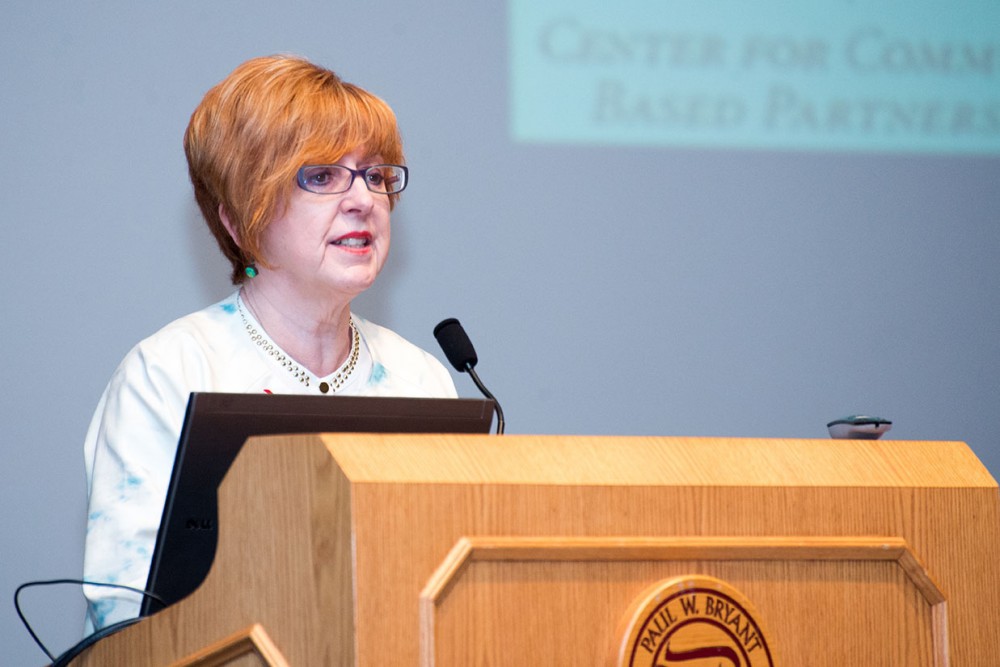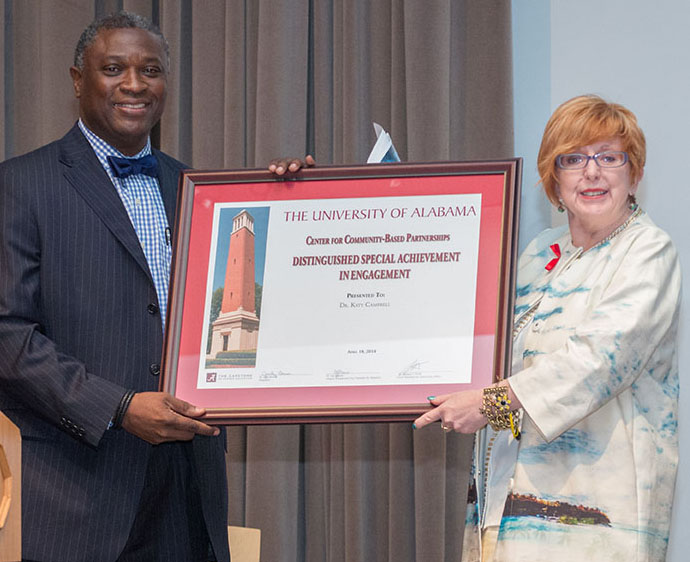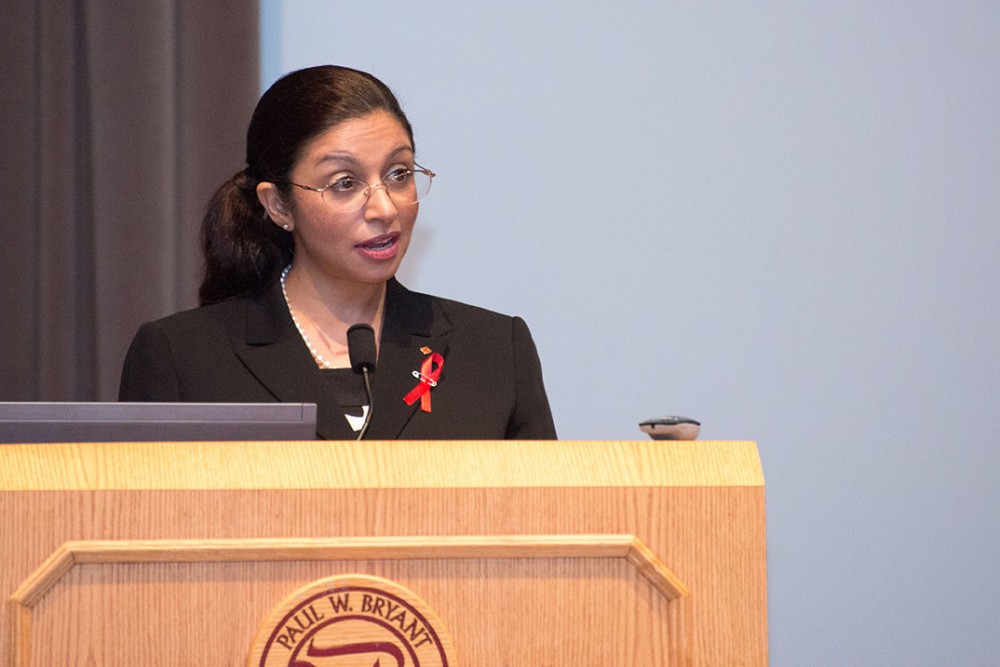Dr. Katy Campbell
Dean of the Faculty of Extension
University of Alberta — Canada

Dr. Katy Campbell, dean of the Faculty of Extension at the University of Alberta, Canada, addresses attendees as the keynote speaker for the eighth annual CCBP Excellence in Engagement Awards Luncheon.
Congratulations to this gathering (and celebration) of engaged scholars! My colleague Professor Lois Gander and I are very honored to be part of this event and intend to liberate the idea for the University of Alberta. Just before we came, we got an apologetic email about the cold weather — only 20 degrees with the possibility of rain. We left snow flurries, wind, and a pretty bleak landscape in Edmonton. In fact, it is too early to swap out my winter wardrobe for my summer wardrobe — and we’re talking six full wardrobe boxes kept in a storage container — so it wasn’t that easy to pack for two days in Alabama.
Dr. Pruitt invited us to talk about engaged scholarship in Canada. In our university, the University of Alberta, we have devoted almost eight years defining Canadian engaged scholarship, although our own faculty, the Faculty of Extension, has been doing it for over 100 years. In Canada, much of what we now characterize as engaged scholarship, or even engagement scholarship, is supported by or contained in units of continuing education.
In 1908, a young professor of mathematics from McGill University in Montreal was invited to the Wild West of Alberta to create a research university. As it turns out the professor, Henry Marshall Tory, was also a Methodist minister. For him, access to higher education was a matter of social justice. Access not just for the sons of the wealthy, or the political elite, but “for the whole people.” Tory said, “The modern state university is a people’s institution. The people demand that knowledge shall not be the concern of scholars alone. The uplifting of the whole people shall be its final goal.”
He didn’t say “the university alone shall be for the uplifting of the whole people,” or “the University of Alberta will produce knowledge that we will then share with the whole people”; he very specifically said that knowledge is produced not only in the laboratories and hallways of the university, and its purpose shall be for the “uplifting of the whole people.” And four years later, in 1912, he created us, the Department of Extension, to exemplify this conviction and promise.
Canada, just like the United States, cannot be neatly described as one culture. All of the New World is a fabulous, complex, multi-layered composition of innumerable cultures and histories. So, while in Western Canada many departments like ours were created in a sort of homage to the American land-grant university or, in our case, the Wisconsin model, community-engaged scholarship across Canada blossomed in many different models that were, and are, socially, culturally, politically, economically, and historically situated. In maritime Canada, for example, engaged scholarship flourished though the Antigonish Movement, based on the conviction universities had to go to the people, and not the other way around. It worked through study circles in which people in exploited communities of fishing, farming, and other small industries of the region critically examined their problems and sought collective solutions, and on the traditions of economic cooperation. However, the Movement did more than start study clubs and distribute information about how to start and manage co-ops. The most difficult task was to peacefully resolve local conflicts and to persuade people about the benefits of working together towards a common goal, breaking old patterns of passivity and dependence.

Dr. Samory Pruitt presents the Distinguished Special Achievement in Engagement award to keynote speaker Dr. Katy Campbell of the University of Alberta – Canada.
In northern Canada, I am very ashamed to admit, engagement has for the most part resembled colonialism. What characterized us, though, for many decades, was a belief in, and passion for, the idea of accessible learning for social action and community capacity-building. For example, my colleague Lois, has devoted her life to the development of the globally unique domain of public legal education, including access to information, and recently, concern for tenant rights and representation that is affordable.
In 1912 President Tory charged his newly graduated student E.F. Ottewell, to “take the university to the people.” This began with English professors taking a horse and buggy, then a Model T Ford, out on muddy lanes into rural Alberta to give lectures on Shakespeare. Over time, outreach was accomplished through provincial radio, bookmobiles, a traveling film library, holding a summer Mud Camp (the beginning of the oil sands), creating a summer arts school in the Rocky Mountains, using the telephone, the television, then the Internet. Sponsoring arts councils and adult education coalitions, creating and locating websites in grocery stores for abused women to find out about their legal rights.
But then the ’70s and ’80s changed the game for all of us and we became increasingly pressured to generate revenue for the university — revenue-generation became a goal, rather than an outcome or a tool, and that brings me to the current age where, if we are not seen to be doing what leads directly to employability, we are wasting taxpayers’ money. In Canada, as in the rest of the Western world, the public is demanding evidence that a university education is worth the investment; in particular that university administrations reallocate resources from education, liberal arts, and the humanities to engineering and technology, especially in resource-rich Alberta.
Okay, what’s the Canadian landscape? This is the project we set out on around 2006, when many factors encouraged us to define, as precisely as possible, what our intellectual domain was and why we were an academic unit and not just a revenue generator. I did my annual Dean-ly walkabouts and we all brought our communities to the table and we consulted our constituencies and our stakeholders, and we had a failed Dean, an External unit review, fought off a lot of predatory Deans, and re-imagined ourselves, from outreach to … engagement. And then we had it! Working with adult learners, or marginalized learners, and offering credentials on weekends, and recovering our costs: These were things we did in the service of learning as a public good, or learning as social action, or learning as capacity-building. And we started studying how that looked around the world, and Canadian ways to practice and understand and talk about it, and value and encourage it. We rethought faculty tenure and promotion. We encouraged subversion in many other shocking ways. And we believe that the more we include our colleagues in the traditional disciplines and community sectors, the more relaxed we will all be about the moral obligations of higher education to the public. And, very fortunately, we have a provost who is a fierce champion and advocate and has carved out and protected space for us to grow this domain.
So, where are we going in Canada? Culturally speaking, or perhaps politically, we tend to be identified with social democracy — so historically we put less emphasis on the individual than the collective, whereas Australia might put relatively more emphasis on industry partnerships, and the UK might put the emphasis elsewhere. As a country, we are defined by great, unpopulated spaces and related challenges, two of which are climate and access to natural resources. Like Australia, we have had to address inequitable physical access to education and have therefore a rich research history related to learning at a distance. We are a plural society, with nations within nations. While community-engaged, or service-learning might look the same across cultures, it is in fact driven by different understandings of power, who has it, who should have it, and for whom it should be used.

Taireez Niswander, a native of Canada, introduces keynote speaker Dr. Katy Campbell of the University of Alberta – Canada.
Finally, how are we trying to disrupt the culture of the traditional, inward-looking, globally ranked research university? Let me tell two very quick stories. We are just undertaking a presidential search. The chair of the Board of Governors came to a Council of the Deans on Wednesday. He was distressed that the external search consultants had come back from a conversation with the deans over breakfast, scratching their heads. Apparently, they were uninspired and downright confused. They said that while the university aspired to be among the great publicly funded research intensive universities, among the top 100 in the world etc., the deans did not seem universally seized of this vision. So we went around the table — were we in or out, faculty by faculty? When it got to me, I said, “You know, we get that and we’re a team player, but we want to know why. Why should we aspire to be in the Top 100? Who does this help? Lots of eye-rolling, which I’m used to, frankly.
Second, when I am challenged to rationalize why we have tenure-track faculty paid to just sit around and think about communities, and talk about a discipline that everyone (i.e. scientists) think is flaky, not only can I point to how we exemplify the kind of transdisciplinary, multisectoral work essential to the global challenges of health, poverty, food security, peace, and environmental degradation, but I can also point to the absolutely passionately networked tsunami of change agents like you, around the world, who are leveraging university community engagement to disrupt a culture of helplessness and despair that things will never change.
So, thank you again for welcoming us to this fabulous, connected university. We are learning so much!